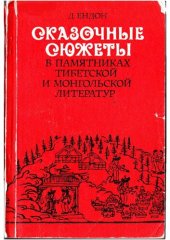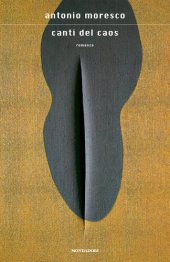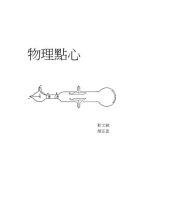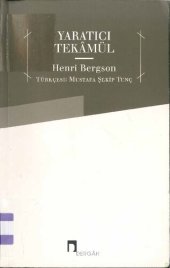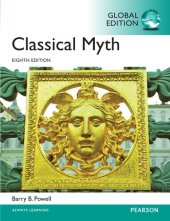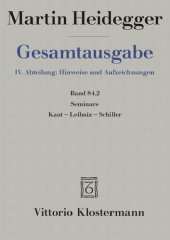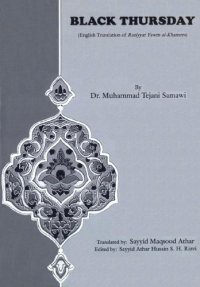
Ebook: Black Thursday
Author: Dr. Muhammad al-Tijani al-Samawi
- Genre: Religion
- Tags: History of Islam Companions of Prophet Muhammad Caliphate of Imam Ali Insurgency of Muawiya Behaviors of Companions Ahlul Bayt Last days of Prophet Muhammad
- Year: 2009
- Publisher: Ansariyan Publications
- Language: English
- pdf
The book, Black Thursday is a story of a grievous incident that occurred hundreds of years ago. However, the Islamic Ummah (nation) feels the pain of this incident even today and it will continue to do so forever.
You are requested to recollect that horrible incident when the last prophet Muhammad (s) was in the final days of his worldly life. The Prophet appointed Usamah ibn Zaid as the commander of his army and ordered Abu Bakr, Umar, Uthman and other Companions to join the army, but the three delayed the departure of army saying that the Prophet was not keeping well. The mother of faithful, Ayesha, was giving them reports from time to time.
She kept her father informed of every event, because she wanted him to lead the congregational prayer in Medina so that the foundation of his Caliphate may be laid.
The Prophet was in severe pain and when he saw people making a commotion, he inquired about the matter. He was told that Abu Bakr is leading the congregation.
When he heard this, he forgot all his pains and taking support of Imam ‘Ali (a) and Abbas, went to the mosque and moved Abu Bakr behind and led the prayer himself.
By leading the prayer himself, the Prophet completely destroyed the foundation of Abu Bakr’s Caliphate. The chief of the prophets expressed his anger over delay in the departure of Usamah’s army.
A grievous incident occurred during those days in Medina. It was Thursday. The Prophet was in severe pain and the people who had stopped the departure of Usamah’s army were present in his house and they visited him during his sickness. Umar was in the forefront of this group.
The Prophet asked for pen and paper, so that he could write something whereby the community may be saved from misguidance after him. He said: ‘I leave behind among you two heavy things – the book of Allah and my Ahl al-Bayt. If you hold onto them, you would not get deviated after me. The two will not separate from each another till they meet me at the cistern of Kauthar.’
Umar disobeyed the Prophet’s order, saying that the Book of Allah (Qur’an) was enough for them. He also said that Muhammad was talking ‘rubbish’. The Prophet got angry at this and ordered them to leave the place. The Prophet’s order was disobeyed in his life itself. What have been done to his sayings after he passed away?
Umar’s statements cannot be proved as good intention or personal exertion (Ijtihaad) in any manner.
The description of this incident and justifications by Ahl al-Sunnah scholars are very weak. To prove their weakness, I would like to put forward excerpts from Allamah Sayyid Abdul Husain Sharafuddin’s books, An-Nass wal Ijtihaad and Al-Murajaat.
You are requested to recollect that horrible incident when the last prophet Muhammad (s) was in the final days of his worldly life. The Prophet appointed Usamah ibn Zaid as the commander of his army and ordered Abu Bakr, Umar, Uthman and other Companions to join the army, but the three delayed the departure of army saying that the Prophet was not keeping well. The mother of faithful, Ayesha, was giving them reports from time to time.
She kept her father informed of every event, because she wanted him to lead the congregational prayer in Medina so that the foundation of his Caliphate may be laid.
The Prophet was in severe pain and when he saw people making a commotion, he inquired about the matter. He was told that Abu Bakr is leading the congregation.
When he heard this, he forgot all his pains and taking support of Imam ‘Ali (a) and Abbas, went to the mosque and moved Abu Bakr behind and led the prayer himself.
By leading the prayer himself, the Prophet completely destroyed the foundation of Abu Bakr’s Caliphate. The chief of the prophets expressed his anger over delay in the departure of Usamah’s army.
A grievous incident occurred during those days in Medina. It was Thursday. The Prophet was in severe pain and the people who had stopped the departure of Usamah’s army were present in his house and they visited him during his sickness. Umar was in the forefront of this group.
The Prophet asked for pen and paper, so that he could write something whereby the community may be saved from misguidance after him. He said: ‘I leave behind among you two heavy things – the book of Allah and my Ahl al-Bayt. If you hold onto them, you would not get deviated after me. The two will not separate from each another till they meet me at the cistern of Kauthar.’
Umar disobeyed the Prophet’s order, saying that the Book of Allah (Qur’an) was enough for them. He also said that Muhammad was talking ‘rubbish’. The Prophet got angry at this and ordered them to leave the place. The Prophet’s order was disobeyed in his life itself. What have been done to his sayings after he passed away?
Umar’s statements cannot be proved as good intention or personal exertion (Ijtihaad) in any manner.
The description of this incident and justifications by Ahl al-Sunnah scholars are very weak. To prove their weakness, I would like to put forward excerpts from Allamah Sayyid Abdul Husain Sharafuddin’s books, An-Nass wal Ijtihaad and Al-Murajaat.
Download the book Black Thursday for free or read online
Continue reading on any device:

Last viewed books
Related books
{related-news}
Comments (0)



